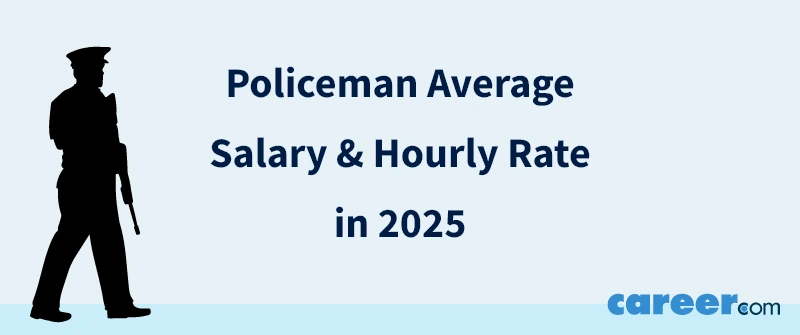Policeman Average Salary & Hourly Rate in 2025

Policemen are responsible for patrolling assigned areas to prevent crime and enforce regulations. They respond to calls, take necessary actions at the disturbance or crime scene, conduct investigations, make arrests, testify in court, and complete reports and routine paperwork.
Types of police and detectives include detectives and criminal investigators who gather evidence in criminal cases, FBI agents who pursue criminal cases against the federal law, fish and game wardens who enforce fishing, hunting, and boating laws, and police and patrol officers who respond to emergency and non-emergency calls.
The policeman salary is affected by different factors like experience level, location, and education. Read on as we give additional information on the salary of policeman, their responsibilities, and job outlook moving forward.
An Overview of Policeman Salaries
As of July 7, 2025, the average policeman salary in the United States is $63,990 per year or $31 per hour. The salary range is between $50,999 to $75,071, with most policemen earning $57,190 to $69,790.
| Percentile | Average Annual Salary |
|---|---|
| 10% | $50,999 |
| 25% | $57,190 |
| 50% | $63,990 |
| 75% | $69,790 |
| 90% | $75,071 |
The industry of job titles influences the policeman salary. According to BLS, government and educational services are the top industries for policemen. Here are the median annual wages of these sectors:
- Government: $77,540
- Educational services; state, local, and private: $64,430
Policeman Salary: Hourly, Weekly, Monthly, and Yearly Breakdown
The average salary for policeman per week is $1,231, while the average policeman salary per month is $5,333. Here is the breakdown of the hourly, weekly, monthly, and yearly salary for policeman:
- Average salary per hour: $31
- Average salary per week: $1,231
- Average salary per month: $5,333
- Average salary per year: $63,990
How Experience Impacts Policeman Salaries
For policeman salary, the entry level with less than a year of experience will get $61,690. A senior level earns $62,690, whereas the expert level with more than 8 years of experience can expect $64,506 per year on average.
- Entry level policeman: $61,690
- Intermediate level policeman: $62,190
- Senior level policeman: $62,690
- Specialist level policeman: $63,690
- Expert level policeman: $64,506
State-by-State Breakdown of Average Salaries for Policeman
An average policeman salary varies from different states in the US due to the industry presence, cost of living, and local economies.
The top 5 states with the highest average policeman salaries are: the District of Columbia at $70,790, California at $70,590, Massachusetts at $69,590, Washington at 69,390, and New Jersey at 69,290.
| State | Average Salary |
|---|---|
| Alaska | $69,190 |
| Alabama | $58,790 |
| Arkansas | $57,790 |
| Arizona | $62,290 |
| California | $70,590 |
| Colorado | $65,290 |
| Connecticut | $68,390 |
| District of Columbia | $70,790 |
| Delaware | $64,790 |
| Florida | $60,490 |
| Georgia | $61,690 |
| Hawaii | $66,890 |
| Iowa | $61,190 |
| Idaho | $59,690 |
| Illinois | $65,190 |
| Indiana | $61,390 |
| Kansas | $60,890 |
| Kentucky | $60,190 |
| Louisiana | $60,790 |
| Massachusetts | $69,590 |
| Maryland | $65,990 |
| Maine | $62,390 |
| Michigan | $62,990 |
| Minnesota | $65,490 |
| Missouri | $60,790 |
| Mississippi | $57,090 |
| Montana | $60,390 |
| North Carolina | $60,790 |
| North Dakota | $63,190 |
| Nebraska | $60,290 |
| New Hampshire | $64,690 |
| New Jersey | $69,290 |
| New Mexico | $59,290 |
| Nevada | $63,290 |
| New York | $67,990 |
| Ohio | $62,290 |
| Oklahoma | $59,090 |
| Oregon | $64,990 |
| Pennsylvania | $63,690 |
| Rhode Island | $66,290 |
| South Carolina | $59,890 |
| South Dakota | $58,090 |
| Tennessee | $59,790 |
| Texas | $62,390 |
| Utah | $61,290 |
| Virginia | $64,390 |
| Vermont | $62,790 |
| Washington | $69,390 |
| Wisconsin | $62,890 |
| West Virginia | $57,590 |
| Wyoming | $61,290 |
Policeman Salaries: Top Earning Cities Revealed
The top 3 cities with the highest salary for policeman are San Jose at $80,690, San Francisco at $79,890, and Oakland at $78,090. Here is the list of other top-paying cities in the United States:
| Top Paying Cities | Average Salary |
|---|---|
| San Jose, CA | $80,690 |
| San Francisco, CA | $79,890 |
| Oakland, CA | $78,090 |
| New York, NY | $74,090 |
| Queens Village, NY | $73,590 |
| Paramus, NJ | $73,090 |
| Passaic, NJ | $73,090 |
Explore Policeman Benefits and Perks Beyond Salary
Policemen receive both salary and benefits for their job. In Salary.com’s HR-reported data, the average total compensation for policemen includes social security, healthcare, and pension.
- Social Security: $5,033
- 401K/403B: $3,092
- Disability: $526
- Healthcare: $6,056
- Pension: $3,618
- Time off: $8,097
Other than these perks, US police agencies have additional benefits alongside a starting salary for policeman.
This includes retirement eligibility, sick leave, family leave, vacation time and holiday pay, paid leaves to fulfill military service obligations, medical and dental health insurance, educational benefits, deferred compensation plan, in-service and specialty trainings, and employee support programs.
Policeman Job Description: Roles and Responsibilities
Policemen protect lives and property. They are responsible for patrolling assigned areas to prevent crime and enforce regulations. They respond to calls, take necessary actions at the disturbance or crime scene, conduct investigations, make arrests, testify in court, and complete reports and routine paperwork in the department.
There are mostly full-time police officers, who have paid overtime hours and shift work to provide protection and safety at all times. According to the BLS, here are the specific roles they usually do:
- Respond to emergency and nonemergency calls
- Patrol assigned areas, observing people and activities
- Conduct traffic stops and issue citations
- Seek restricted-access databases for vehicle or other records and warrants
- Obtain and serve warrants for arrests, searches, and other purposes
- Arrest people suspected of committing crimes
- Ensure the safety of individuals in custody
- Collect and secure evidence from crime scenes
- Observe the activities of suspects
- Write detailed reports and fill out forms
- Arrange cases for legal proceedings and testify in court
When and How to Ask for a Raise as a Policeman
As a policeman, the safety of people and crime prevention are your priorities. Pay raises for policemen are usually based on rank and years of experience. They become eligible for a promotion after a probationary period.
Salary increases due to promotion to corporal, sergeant, lieutenant, and captain can be achieved when a policeman achieves written examination and on-the-job performance. Along with this, here are steps on when and how to ask for a pay raise as a police officer:
- Reflect on achievements. Assess your performance as a police officer in terms of how you reduced the crime rate in the assigned area, law enforcement and knowledge, mental and physical agility, critical thinking, sense of ethics, problem-solving skills, and devotion to community safety.
- Research on benchmarks. Look at market trends and identify the most appropriate salary that aligns with your current position, qualification, location, and industry. The average salary for policeman in the United States is $63,990 per year or $31 per hour.
- Choose the perfect time. To ensure positive outcomes, pitch your proposal when you have a record of successful crime investigations and resolutions, crime rates have reduced in the assigned area, and a safe and orderly community is maintained.
- Be open to discussion. Healthy negotiation is key to good pay raise experience. Avoid using demanding tones and participate in solutions and alternatives. Listen while properly articulating your grounds.
Why Does Policeman Make So Much?
Most police officers are required to have at least a high school diploma, a college degree, college credits or course work, and they must complete training or attend a police academy before undergoing on-the-job training.
They must meet thorough physical and personal qualifications, at the age of at least 21 years. A certain number of years of experience is also required, such as 1 to 3 years of related experience, at least 12 to 18 months of law enforcement experience, and firearms certification.
It also helps that policemen have highly compensated skills, which translates to higher salary increases. In Salary.com’s Real-time Job Posting Salary Data, you can view job skills for policemen that give them greater compensation:
- Investigation Techniques and Tools: +10.13% salary increase
- Patrolling: +9.19% salary increase
- Surveillance: +7.39% salary increase
- Public Safety and Security: +6.76% salary increase
- Emergency Response: +6.72% salary increase
- Knowledge of Criminal Justice System: +5.43% salary increase
The Future of Policeman: Job Outlook and Career Trends
From 2023 to 2033, BLS projects that the employment of policemen will grow by 4%, which is faster than the average for all jobs. In fact, there are an average of 63,000 job openings for police and detectives every year. These openings are due to employees transferring to different occupations or exiting the labor force, such as to retire.
Since public safety is an important aspect to every citizen, there is a need for more officers even when crime rates decrease. Demands for their employment, however, vary depending on locations and local and state budgets.
This includes various occupational titles for police and detectives, such as detectives and criminal investigators, fish and game wardens, police and sheriff’s patrol officers, and transit and railroad police.



